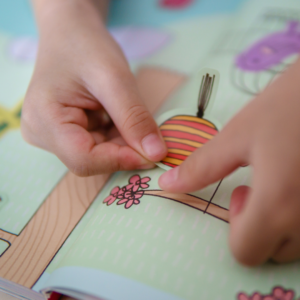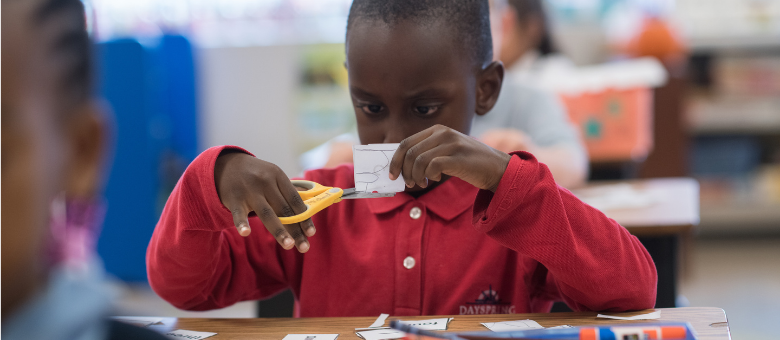Fine motor skills are a part of the criteria observed when a preschool, pre-kindergarten, or kindergarten student applies at Dayspring Christian Academy. Over the last decade, Dayspring teachers have noticed a shocking decline in fine motor skills and are rightly concerned. What are fine motor skills? Why do they matter?
What are Fine Motor Skills?
According to HealthLine.com, fine motor skills work the smaller muscles of the hands, fingers, and wrists. Fine motor skills are about dexterity. In the context of a preschool, pre-k, or kindergarten student, fine motor skills include activities like holding a pencil, cutting with scissors, feeding oneself with a spoon or fork, buttoning or snapping articles of clothing, and building with Lego-like blocks or bristle blocks.
The long-term effects of underdeveloped fine motor skills can include social, language, perceptual, and cognitive skills. Naturally, these factors can have a lifetime impact on a child if not addressed appropriately. So, what can parents to do ensure that their child’s fine motor skills develop appropriately as their child grows?
Since fine motor skills involve the muscles in the wrists, hands, and fingers, there are many opportunities a parent can present to his or her youngster to strengthen these muscles. Remember, this article is meant to be strictly informational and not a substitute for a doctor’s advice. Please check with your child’s pediatrician if you have questions regarding developing fine motor skills.
How Can Parents Assist in Developing Fine Motor Skills?
 Perhaps the greatest and most wise way to develop your child’s fine motor skills is to severely limit or completely exclude any electronics time, especially in the infant stages. Screens are addicting to small children. In addition to loss of interest in other activities, lack of sleep, speech delays, and impaired social skills are associated with screen time. In fact, medical professionals recommend NO screen time for children under the age of 2. Of children aged 2 to 5, the Mayo Clinic says, “By age 2, children can benefit from some types of screen time, such as programming with music, movement and stories. By watching together, you can help your child understand what he or she is seeing and apply it in real life. However, passive screen time shouldn’t replace reading, playing or problem-solving.”
Perhaps the greatest and most wise way to develop your child’s fine motor skills is to severely limit or completely exclude any electronics time, especially in the infant stages. Screens are addicting to small children. In addition to loss of interest in other activities, lack of sleep, speech delays, and impaired social skills are associated with screen time. In fact, medical professionals recommend NO screen time for children under the age of 2. Of children aged 2 to 5, the Mayo Clinic says, “By age 2, children can benefit from some types of screen time, such as programming with music, movement and stories. By watching together, you can help your child understand what he or she is seeing and apply it in real life. However, passive screen time shouldn’t replace reading, playing or problem-solving.”
Throwing balls, making towers, playing with Play-doh, and even helping with household chores are great ways to aid in the development of fine motor skills. Drinking from a cup, helping to turn pages of a book during reading time, and using a spoon can also help.
Some things to teach your child as he/she grows can include:
- Turning the doorknob
- Taking off shoes
- Unzipping jacket/coat
- Removing lids, both snap-on and screw-on
- Holding and using age-appropriate crayon or other writing utensil
- Put pegs in holes
- Piecing together age-appropriate puzzles
- Operating switches, gears, pulleys, etc. in an activity center
- Pouring small amounts of liquid from one vessel to another
- Cutting shapes from paper with child-safe scissors
- Pulling stickers off a sticker sheet and putting them in a sticker book
Give Opportunities for Independence
Most families will admit to a schedule that seems to never slow down. Without an intentional effort to slow down, opportunities to develop fine motor skills can easily be missed. This is especially true of the modern parent. With a never-ending task list, many caregivers may find themselves doing things for their children because it is easier, if not faster, to do so. While it might not be as easy or as fast to have a child fold his socks or put away the clean silverware from the dishwasher, these are some of the tasks that not only help to develop fine motor skills but also help to raise an independent child!
The development of fine motor skills really lies in the day-to-day activities of life. For example, your child can help with:
- Sorting, folding, and putting laundry away
- Emptying the dishwasher with supervision
- Putting the crayons back in the box after use
- Rinsing hair and body in the bathtub by pouring water from a cup over him/herself
- Helping to pack lunches (take the lid off the peanut butter, spread with a knife, put the lid back on)
- Sharpening pencils with a non-electric sharpener
With the right training, children can develop not only their fine motor skills, but a sense of confidence and independence. Tasks like these require fine motor skills that are easy for a parent to take for granted, but imperative for a child to learn as he prepares for life.
How Do Teachers Assist with Developing Fine Motor Skills?
 Of course, at age 3, enrolling your child in a local preschool can help with fine motor skill development. At Dayspring Christian Academy, our preschool program has an activity-driven focus. Naturally, these activities are not only designed to educate the mind, but to shape the character and develop the physical abilities (including the fine motor skills) of the preschool student. While it is not unusual for a parent to question the value of enrolling at a brick-and-mortar preschool, the in-person preschool environment allows experts to come alongside parents and lay key foundations in the development of the child. While we address the necessity of preschool in another blog, we do believe that educating a preschool-aged child in manners, proper social behavior, relational interactions, academic knowledge, and spiritual concepts that take root in the heart is no small feat. This often feels overwhelming for a parent attempting to school by himself. Many preschool parents appreciate the seasoned perspective experienced preschool teachers offer. In a preschool setting, children are exposed to friendships and experiences they may not have at home and parents are encouraged as their child’s unique gifts and personalities are seen through someone else’s eyes.
Of course, at age 3, enrolling your child in a local preschool can help with fine motor skill development. At Dayspring Christian Academy, our preschool program has an activity-driven focus. Naturally, these activities are not only designed to educate the mind, but to shape the character and develop the physical abilities (including the fine motor skills) of the preschool student. While it is not unusual for a parent to question the value of enrolling at a brick-and-mortar preschool, the in-person preschool environment allows experts to come alongside parents and lay key foundations in the development of the child. While we address the necessity of preschool in another blog, we do believe that educating a preschool-aged child in manners, proper social behavior, relational interactions, academic knowledge, and spiritual concepts that take root in the heart is no small feat. This often feels overwhelming for a parent attempting to school by himself. Many preschool parents appreciate the seasoned perspective experienced preschool teachers offer. In a preschool setting, children are exposed to friendships and experiences they may not have at home and parents are encouraged as their child’s unique gifts and personalities are seen through someone else’s eyes.
At age 4, pre-kindergarten students at Dayspring are still in an activity-oriented environment designed to continue to fine-tune or enhance fine motor skills. By age 5, the time students enter a kindergarten program, their fine motor skills should include tying his/her shoes, mostly able to dress him/herself, use utensils easily, and more.
Practice Makes Perfect
As with any skill, fine motor skills take time to develop. Parents must be intentional in providing opportunities for their child(ren) to engage in building their fine motor skills. The first few years of life are a tender time, yet a time when the child is exploring his/her world and making connections about how things work. The responsibility given to parents in Proverbs 22:6 to “train up a child in the way he should go” lest he depart from it can be applied to the development of fine motor skills. The verse implies the responsibility of the parent to lay the foundations of moral, spiritual, academic, and general life skills. It makes sense that the parent who decides to follow this biblical order would invest heavily in their child’s day to day experiences to develop the fine motor skills necessary for success in preschool, pre-k, kindergarten, and beyond.
At Dayspring Christian Academy, we are committed to raising up the next generation of Christian leaders who acknowledge the Lordship of Jesus Christ in every area of life, demonstrate a biblical worldview, become citizens of excellence in Christian character and scholarship, and aid in the restoration of America’s biblical foundation. If you would like to learn more about Dayspring Christian Academy, please contact Karol Hasting at 717-285-2000 or schedule a private tour using the button below.

